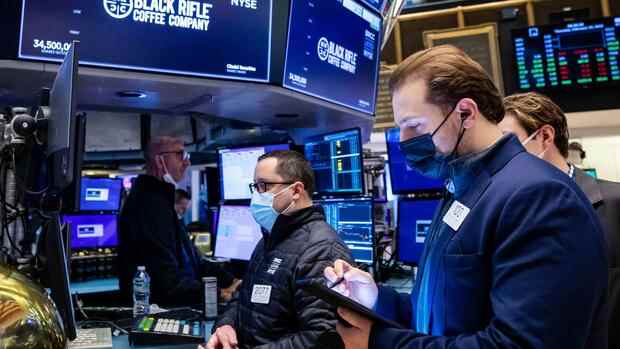Frankfurt bear market. Investors haven’t uttered this word, which is feared on the stock exchanges, for a long time. For a long time since the low after the corona crash in March 2020, the stock markets have only gone up steeply. But that has changed this year. Since the beginning of the year, the broad stock index MSCI World has lost nine percent at its peak, while the US benchmark index S&P 500 has lost a good eight percent.
The stock exchanges are still a long way from a bear market, which investors see starting from the high with a loss of at least 20 percent. But the fear of such a thing, in which more and more investors are getting nervous and the prices usually slide more than 20 percent, is there.
That’s according to Bank of America’s (BofA) monthly survey of 363 portfolio managers at mutual fund houses, corporations, banks, insurers, and pension funds that collectively manage $1 trillion in assets. 30 percent of those surveyed explicitly see the danger that the stock exchanges will slip into a bear market this year.
Two points in particular could trigger a significant slide in share prices. 41 percent of all respondents see higher than expected interest rate increases as the greatest unforeseen risk for the stock markets. 23 percent of fund managers name higher-than-expected inflation as the top risk.
Top jobs of the day
Find the best jobs now and
be notified by email.
Is the bear market coming?
The BofA strategists explicitly see an even greater risk of a bear market than the fund managers who took part in the survey. In fact, fund manager sentiment could be even worse than the survey reflects. Because the survey, which lasted almost a week, ended last Thursday.
Since then there have been even more negative headlines about the dangers for the economy and the stock exchanges. On the one hand, it is about Ukraine: The signs of an impending Russian invasion of Ukraine have increased since the weekend, even if reports on Tuesday of an announced withdrawal of Russian armed forces from the border area with Ukraine caused some reassurance.
>> Read here: Putin announces talks with USA and NATO on – Scholz confirms threats of sanctions
The situation is unclear, but Martin Lück, one of the leading capital market strategists at the Blackrock fund, emphasized on Tuesday: “Should the Russian army actually invade Ukraine, this would make the difference for stock investors for the year 2022 as a whole: the difference between an exhausting but straight one have a good year and one to forget.”
Lück justifies this with a probable fear of risk in a war on European territory and then with the dramatic increase in energy prices and consequences for world trade.
Disturbing data after the survey
The situation has also worsened with regard to inflation and interest rate concerns since the end of the survey. Since then, the USA has reported a significantly higher than expected increase in consumer prices to 7.5 percent in January, the highest level in over 40 years.
As a result, investors – measured on the futures markets – are now expecting the US Federal Reserve to raise interest rates seven times, which is one or two more than before.
The expectation of higher interest rates is causing problems for US technology stocks in particular. The US technology exchange Nasdaq was 15 percent below its all-time high at the end of January and was therefore quite close to a bear market.
That’s largely because tech stocks trade more on the basis of companies’ future earnings. However, when future profits are discounted at a higher interest rate, it lowers their value today.
In addition, at the beginning of February, the more than 26 percent daily slump in the shares of the Facebook group Meta. The news that fewer users have been using the social media platform recently shocked investors. Against this background, the good figures from Amazon and Google’s parent company Alphabet and the price increases in Amazon and Alphabet shares faded.
First underweight in tech stocks since August 2016
In any case, the investors surveyed by BofA have continued to flee tech stocks over the past four weeks. The bottom line is that they have been underweight in tech stocks for the first time since December 2008 and thus since the financial crisis.
The shares of the Facebook group have crashed.
(Photo: dpa)
At eight percent, the underweight was as extreme as it had been in August 2006. The overweight in tech stocks had already fallen drastically in the survey a month ago.
Overall, fund managers are still overweight in equities, but a kind of flight is also evident here. The average overweight is just 30 percent down from 55 percent a month ago.
cash is king
A look at their cash holdings also shows how nervous investors are. The cash quota in the portfolios rose by an average of 0.3 percentage points to 5.3 percent. This is the highest level since May 2020. Even more meaningful: 38 percent of investors hold more cash than the asset allocation for their houses specifies
Nevertheless, the fund managers also have some hope: They rely on a so-called “Fed Put” if the stock markets fall too much. If the S&P 500 slipped to 3700 points – and from today’s perspective a further 17 percent loss – the US Federal Reserve (Fed) would probably raise interest rates less sharply in the opinion of most investors.
The Fed would then support the markets again and clear the way for the S&P 500 to reach 5000 points. On this reading, a bear market, even if it materializes as 30 percent of fund managers expect, would likely be short-lived.
More: Rising interest rates are dividing the stock exchanges – things are now getting critical for these stocks
